Entrepreneurship and Small Business Management
VerifiedAdded on 2023/01/11
|11
|2698
|59
AI Summary
This report explores different types of entrepreneurial ventures and their relationship with typology of entrepreneurship. It also discusses the similarities and differences between these ventures. Furthermore, it examines the impact of micro and small businesses on the economy and the importance of small business and startups for the growth of social economy. Additionally, it delves into the characteristics and skills of entrepreneurs and the difference between them and business managers. Lastly, it explores the background and experience of entrepreneurship.
Contribute Materials
Your contribution can guide someone’s learning journey. Share your
documents today.

ENTREPRENEURSHIP AND
SMALL BUSINESS
MANAGEMENT
SMALL BUSINESS
MANAGEMENT
Secure Best Marks with AI Grader
Need help grading? Try our AI Grader for instant feedback on your assignments.
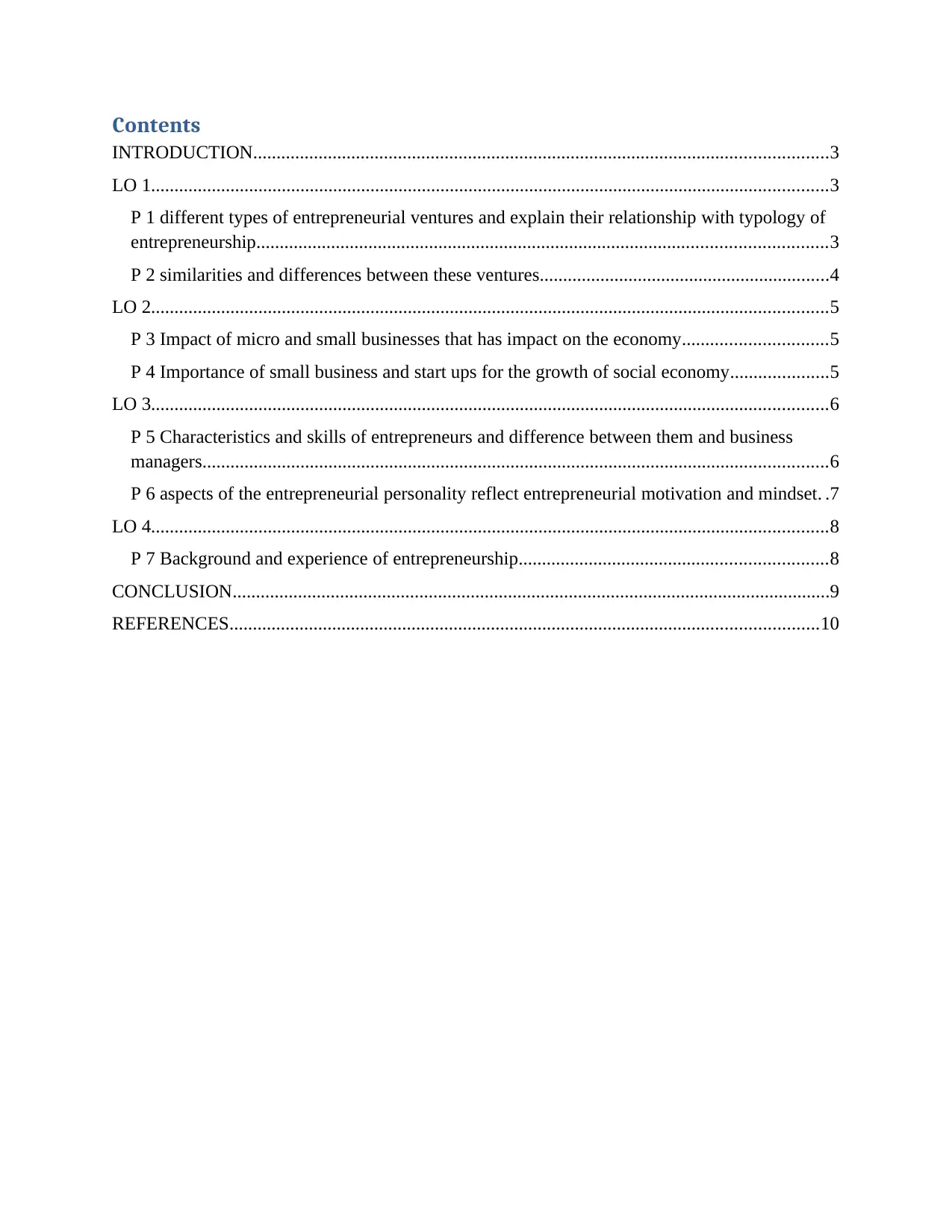
Contents
INTRODUCTION...........................................................................................................................3
LO 1.................................................................................................................................................3
P 1 different types of entrepreneurial ventures and explain their relationship with typology of
entrepreneurship..........................................................................................................................3
P 2 similarities and differences between these ventures..............................................................4
LO 2.................................................................................................................................................5
P 3 Impact of micro and small businesses that has impact on the economy...............................5
P 4 Importance of small business and start ups for the growth of social economy.....................5
LO 3.................................................................................................................................................6
P 5 Characteristics and skills of entrepreneurs and difference between them and business
managers......................................................................................................................................6
P 6 aspects of the entrepreneurial personality reflect entrepreneurial motivation and mindset. .7
LO 4.................................................................................................................................................8
P 7 Background and experience of entrepreneurship..................................................................8
CONCLUSION................................................................................................................................9
REFERENCES..............................................................................................................................10
INTRODUCTION...........................................................................................................................3
LO 1.................................................................................................................................................3
P 1 different types of entrepreneurial ventures and explain their relationship with typology of
entrepreneurship..........................................................................................................................3
P 2 similarities and differences between these ventures..............................................................4
LO 2.................................................................................................................................................5
P 3 Impact of micro and small businesses that has impact on the economy...............................5
P 4 Importance of small business and start ups for the growth of social economy.....................5
LO 3.................................................................................................................................................6
P 5 Characteristics and skills of entrepreneurs and difference between them and business
managers......................................................................................................................................6
P 6 aspects of the entrepreneurial personality reflect entrepreneurial motivation and mindset. .7
LO 4.................................................................................................................................................8
P 7 Background and experience of entrepreneurship..................................................................8
CONCLUSION................................................................................................................................9
REFERENCES..............................................................................................................................10
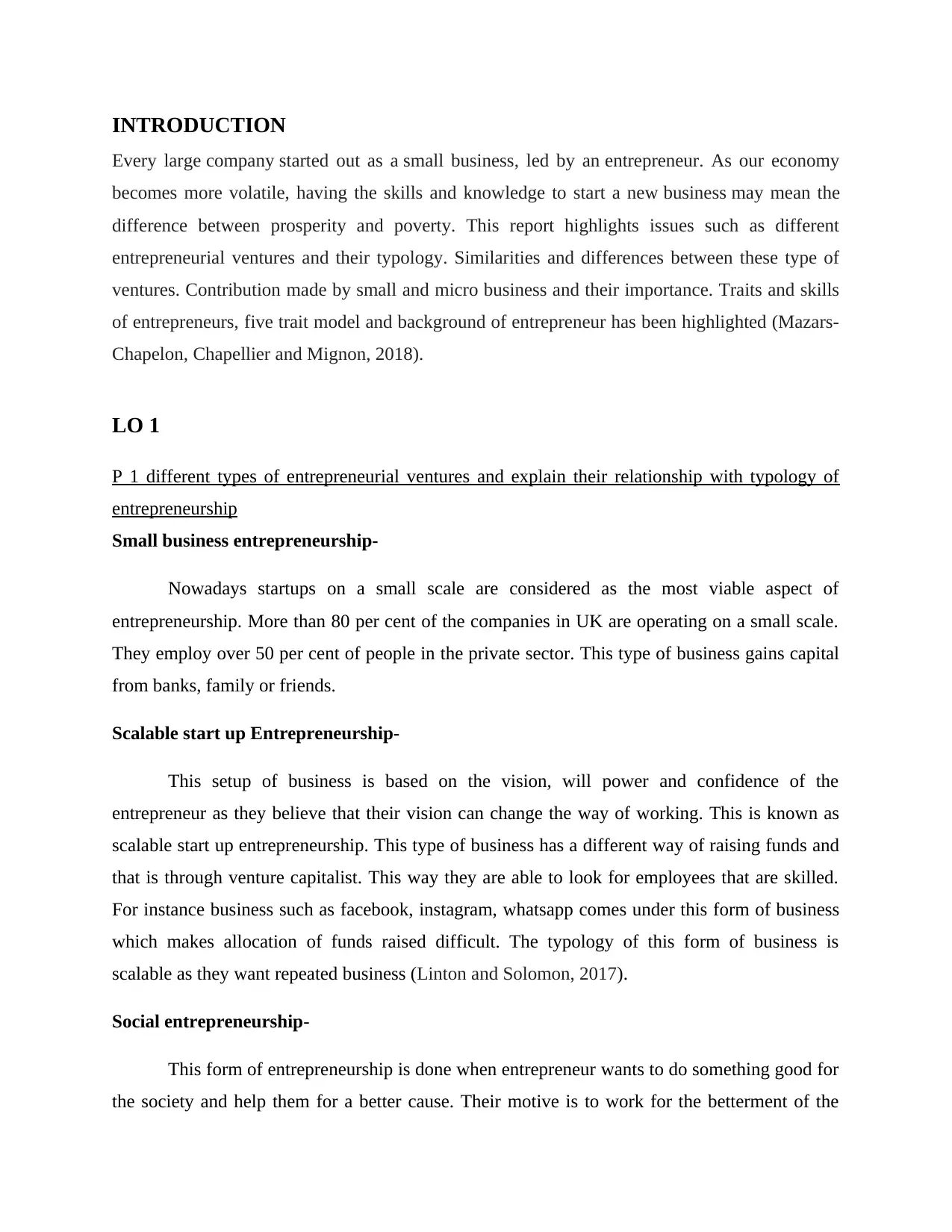
INTRODUCTION
Every large company started out as a small business, led by an entrepreneur. As our economy
becomes more volatile, having the skills and knowledge to start a new business may mean the
difference between prosperity and poverty. This report highlights issues such as different
entrepreneurial ventures and their typology. Similarities and differences between these type of
ventures. Contribution made by small and micro business and their importance. Traits and skills
of entrepreneurs, five trait model and background of entrepreneur has been highlighted (Mazars-
Chapelon, Chapellier and Mignon, 2018).
LO 1
P 1 different types of entrepreneurial ventures and explain their relationship with typology of
entrepreneurship
Small business entrepreneurship-
Nowadays startups on a small scale are considered as the most viable aspect of
entrepreneurship. More than 80 per cent of the companies in UK are operating on a small scale.
They employ over 50 per cent of people in the private sector. This type of business gains capital
from banks, family or friends.
Scalable start up Entrepreneurship-
This setup of business is based on the vision, will power and confidence of the
entrepreneur as they believe that their vision can change the way of working. This is known as
scalable start up entrepreneurship. This type of business has a different way of raising funds and
that is through venture capitalist. This way they are able to look for employees that are skilled.
For instance business such as facebook, instagram, whatsapp comes under this form of business
which makes allocation of funds raised difficult. The typology of this form of business is
scalable as they want repeated business (Linton and Solomon, 2017).
Social entrepreneurship-
This form of entrepreneurship is done when entrepreneur wants to do something good for
the society and help them for a better cause. Their motive is to work for the betterment of the
Every large company started out as a small business, led by an entrepreneur. As our economy
becomes more volatile, having the skills and knowledge to start a new business may mean the
difference between prosperity and poverty. This report highlights issues such as different
entrepreneurial ventures and their typology. Similarities and differences between these type of
ventures. Contribution made by small and micro business and their importance. Traits and skills
of entrepreneurs, five trait model and background of entrepreneur has been highlighted (Mazars-
Chapelon, Chapellier and Mignon, 2018).
LO 1
P 1 different types of entrepreneurial ventures and explain their relationship with typology of
entrepreneurship
Small business entrepreneurship-
Nowadays startups on a small scale are considered as the most viable aspect of
entrepreneurship. More than 80 per cent of the companies in UK are operating on a small scale.
They employ over 50 per cent of people in the private sector. This type of business gains capital
from banks, family or friends.
Scalable start up Entrepreneurship-
This setup of business is based on the vision, will power and confidence of the
entrepreneur as they believe that their vision can change the way of working. This is known as
scalable start up entrepreneurship. This type of business has a different way of raising funds and
that is through venture capitalist. This way they are able to look for employees that are skilled.
For instance business such as facebook, instagram, whatsapp comes under this form of business
which makes allocation of funds raised difficult. The typology of this form of business is
scalable as they want repeated business (Linton and Solomon, 2017).
Social entrepreneurship-
This form of entrepreneurship is done when entrepreneur wants to do something good for
the society and help them for a better cause. Their motive is to work for the betterment of the
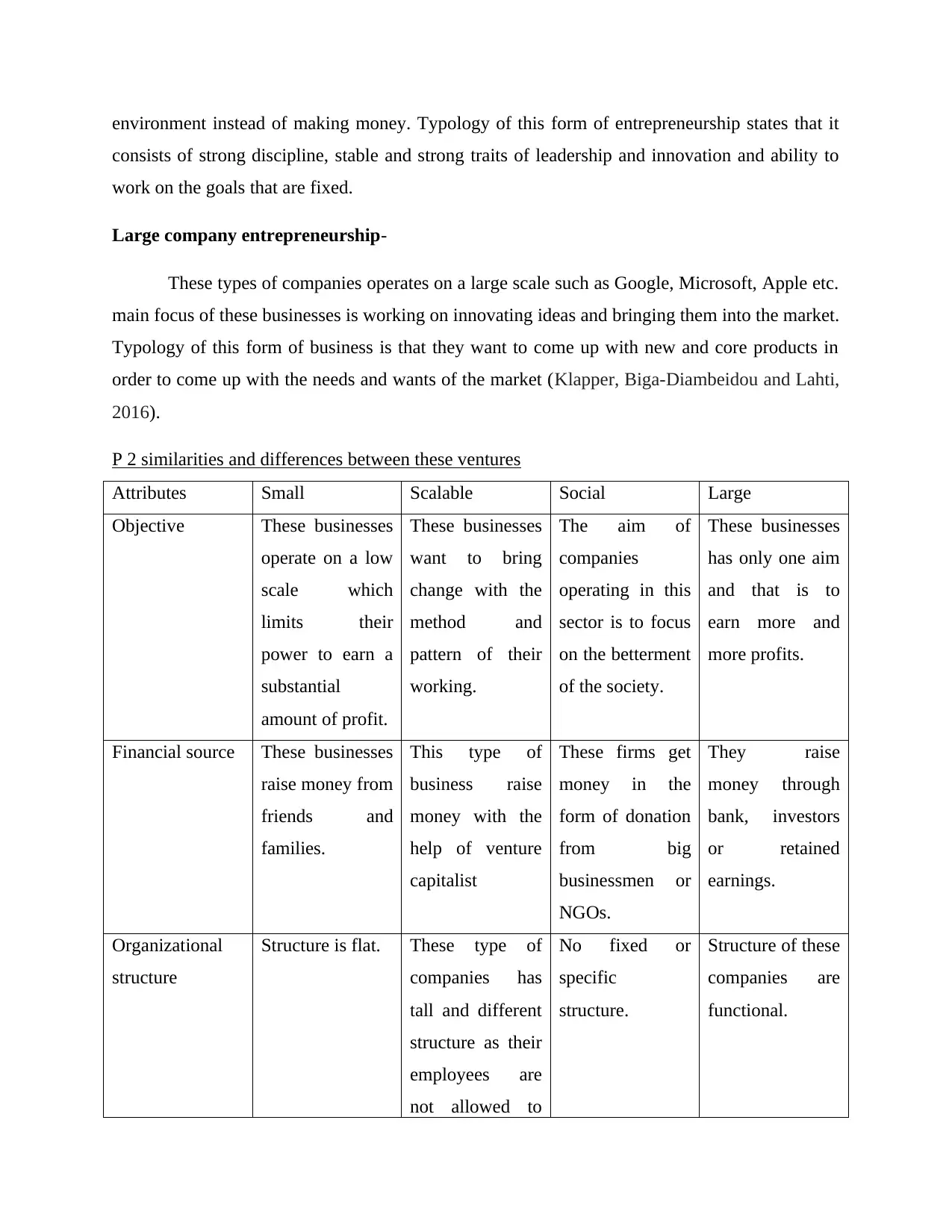
environment instead of making money. Typology of this form of entrepreneurship states that it
consists of strong discipline, stable and strong traits of leadership and innovation and ability to
work on the goals that are fixed.
Large company entrepreneurship-
These types of companies operates on a large scale such as Google, Microsoft, Apple etc.
main focus of these businesses is working on innovating ideas and bringing them into the market.
Typology of this form of business is that they want to come up with new and core products in
order to come up with the needs and wants of the market (Klapper, Biga-Diambeidou and Lahti,
2016).
P 2 similarities and differences between these ventures
Attributes Small Scalable Social Large
Objective These businesses
operate on a low
scale which
limits their
power to earn a
substantial
amount of profit.
These businesses
want to bring
change with the
method and
pattern of their
working.
The aim of
companies
operating in this
sector is to focus
on the betterment
of the society.
These businesses
has only one aim
and that is to
earn more and
more profits.
Financial source These businesses
raise money from
friends and
families.
This type of
business raise
money with the
help of venture
capitalist
These firms get
money in the
form of donation
from big
businessmen or
NGOs.
They raise
money through
bank, investors
or retained
earnings.
Organizational
structure
Structure is flat. These type of
companies has
tall and different
structure as their
employees are
not allowed to
No fixed or
specific
structure.
Structure of these
companies are
functional.
consists of strong discipline, stable and strong traits of leadership and innovation and ability to
work on the goals that are fixed.
Large company entrepreneurship-
These types of companies operates on a large scale such as Google, Microsoft, Apple etc.
main focus of these businesses is working on innovating ideas and bringing them into the market.
Typology of this form of business is that they want to come up with new and core products in
order to come up with the needs and wants of the market (Klapper, Biga-Diambeidou and Lahti,
2016).
P 2 similarities and differences between these ventures
Attributes Small Scalable Social Large
Objective These businesses
operate on a low
scale which
limits their
power to earn a
substantial
amount of profit.
These businesses
want to bring
change with the
method and
pattern of their
working.
The aim of
companies
operating in this
sector is to focus
on the betterment
of the society.
These businesses
has only one aim
and that is to
earn more and
more profits.
Financial source These businesses
raise money from
friends and
families.
This type of
business raise
money with the
help of venture
capitalist
These firms get
money in the
form of donation
from big
businessmen or
NGOs.
They raise
money through
bank, investors
or retained
earnings.
Organizational
structure
Structure is flat. These type of
companies has
tall and different
structure as their
employees are
not allowed to
No fixed or
specific
structure.
Structure of these
companies are
functional.
Secure Best Marks with AI Grader
Need help grading? Try our AI Grader for instant feedback on your assignments.
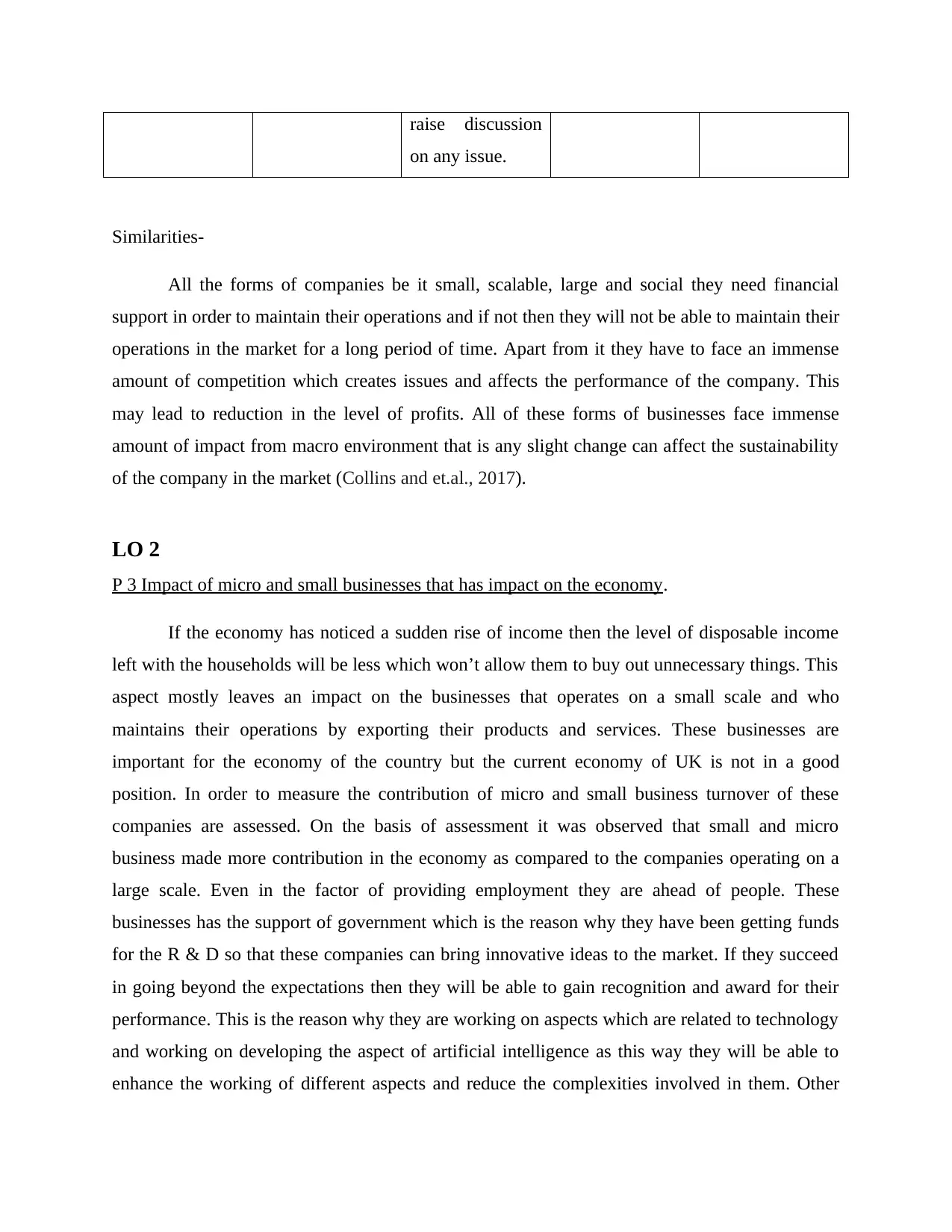
raise discussion
on any issue.
Similarities-
All the forms of companies be it small, scalable, large and social they need financial
support in order to maintain their operations and if not then they will not be able to maintain their
operations in the market for a long period of time. Apart from it they have to face an immense
amount of competition which creates issues and affects the performance of the company. This
may lead to reduction in the level of profits. All of these forms of businesses face immense
amount of impact from macro environment that is any slight change can affect the sustainability
of the company in the market (Collins and et.al., 2017).
LO 2
P 3 Impact of micro and small businesses that has impact on the economy.
If the economy has noticed a sudden rise of income then the level of disposable income
left with the households will be less which won’t allow them to buy out unnecessary things. This
aspect mostly leaves an impact on the businesses that operates on a small scale and who
maintains their operations by exporting their products and services. These businesses are
important for the economy of the country but the current economy of UK is not in a good
position. In order to measure the contribution of micro and small business turnover of these
companies are assessed. On the basis of assessment it was observed that small and micro
business made more contribution in the economy as compared to the companies operating on a
large scale. Even in the factor of providing employment they are ahead of people. These
businesses has the support of government which is the reason why they have been getting funds
for the R & D so that these companies can bring innovative ideas to the market. If they succeed
in going beyond the expectations then they will be able to gain recognition and award for their
performance. This is the reason why they are working on aspects which are related to technology
and working on developing the aspect of artificial intelligence as this way they will be able to
enhance the working of different aspects and reduce the complexities involved in them. Other
on any issue.
Similarities-
All the forms of companies be it small, scalable, large and social they need financial
support in order to maintain their operations and if not then they will not be able to maintain their
operations in the market for a long period of time. Apart from it they have to face an immense
amount of competition which creates issues and affects the performance of the company. This
may lead to reduction in the level of profits. All of these forms of businesses face immense
amount of impact from macro environment that is any slight change can affect the sustainability
of the company in the market (Collins and et.al., 2017).
LO 2
P 3 Impact of micro and small businesses that has impact on the economy.
If the economy has noticed a sudden rise of income then the level of disposable income
left with the households will be less which won’t allow them to buy out unnecessary things. This
aspect mostly leaves an impact on the businesses that operates on a small scale and who
maintains their operations by exporting their products and services. These businesses are
important for the economy of the country but the current economy of UK is not in a good
position. In order to measure the contribution of micro and small business turnover of these
companies are assessed. On the basis of assessment it was observed that small and micro
business made more contribution in the economy as compared to the companies operating on a
large scale. Even in the factor of providing employment they are ahead of people. These
businesses has the support of government which is the reason why they have been getting funds
for the R & D so that these companies can bring innovative ideas to the market. If they succeed
in going beyond the expectations then they will be able to gain recognition and award for their
performance. This is the reason why they are working on aspects which are related to technology
and working on developing the aspect of artificial intelligence as this way they will be able to
enhance the working of different aspects and reduce the complexities involved in them. Other
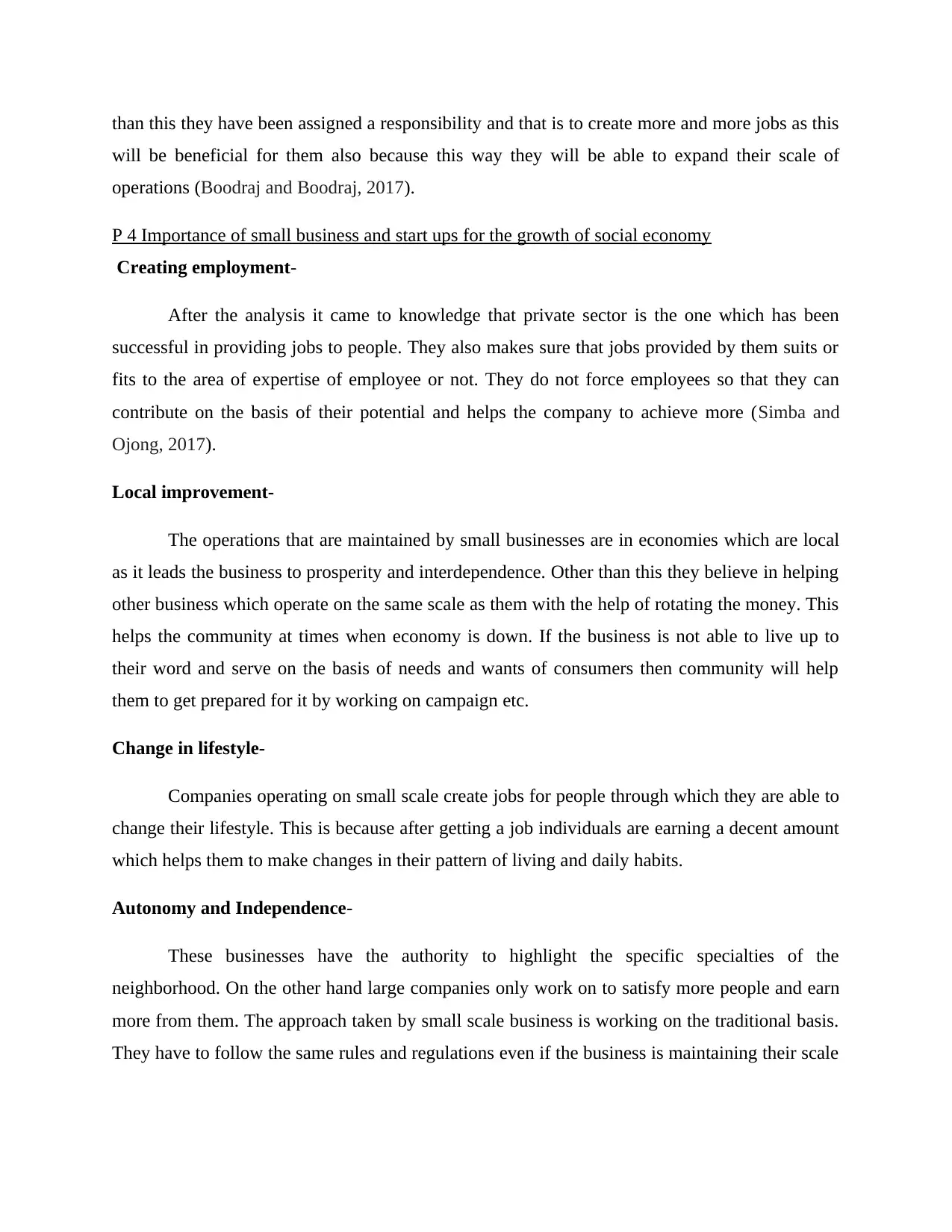
than this they have been assigned a responsibility and that is to create more and more jobs as this
will be beneficial for them also because this way they will be able to expand their scale of
operations (Boodraj and Boodraj, 2017).
P 4 Importance of small business and start ups for the growth of social economy
Creating employment-
After the analysis it came to knowledge that private sector is the one which has been
successful in providing jobs to people. They also makes sure that jobs provided by them suits or
fits to the area of expertise of employee or not. They do not force employees so that they can
contribute on the basis of their potential and helps the company to achieve more (Simba and
Ojong, 2017).
Local improvement-
The operations that are maintained by small businesses are in economies which are local
as it leads the business to prosperity and interdependence. Other than this they believe in helping
other business which operate on the same scale as them with the help of rotating the money. This
helps the community at times when economy is down. If the business is not able to live up to
their word and serve on the basis of needs and wants of consumers then community will help
them to get prepared for it by working on campaign etc.
Change in lifestyle-
Companies operating on small scale create jobs for people through which they are able to
change their lifestyle. This is because after getting a job individuals are earning a decent amount
which helps them to make changes in their pattern of living and daily habits.
Autonomy and Independence-
These businesses have the authority to highlight the specific specialties of the
neighborhood. On the other hand large companies only work on to satisfy more people and earn
more from them. The approach taken by small scale business is working on the traditional basis.
They have to follow the same rules and regulations even if the business is maintaining their scale
will be beneficial for them also because this way they will be able to expand their scale of
operations (Boodraj and Boodraj, 2017).
P 4 Importance of small business and start ups for the growth of social economy
Creating employment-
After the analysis it came to knowledge that private sector is the one which has been
successful in providing jobs to people. They also makes sure that jobs provided by them suits or
fits to the area of expertise of employee or not. They do not force employees so that they can
contribute on the basis of their potential and helps the company to achieve more (Simba and
Ojong, 2017).
Local improvement-
The operations that are maintained by small businesses are in economies which are local
as it leads the business to prosperity and interdependence. Other than this they believe in helping
other business which operate on the same scale as them with the help of rotating the money. This
helps the community at times when economy is down. If the business is not able to live up to
their word and serve on the basis of needs and wants of consumers then community will help
them to get prepared for it by working on campaign etc.
Change in lifestyle-
Companies operating on small scale create jobs for people through which they are able to
change their lifestyle. This is because after getting a job individuals are earning a decent amount
which helps them to make changes in their pattern of living and daily habits.
Autonomy and Independence-
These businesses have the authority to highlight the specific specialties of the
neighborhood. On the other hand large companies only work on to satisfy more people and earn
more from them. The approach taken by small scale business is working on the traditional basis.
They have to follow the same rules and regulations even if the business is maintaining their scale
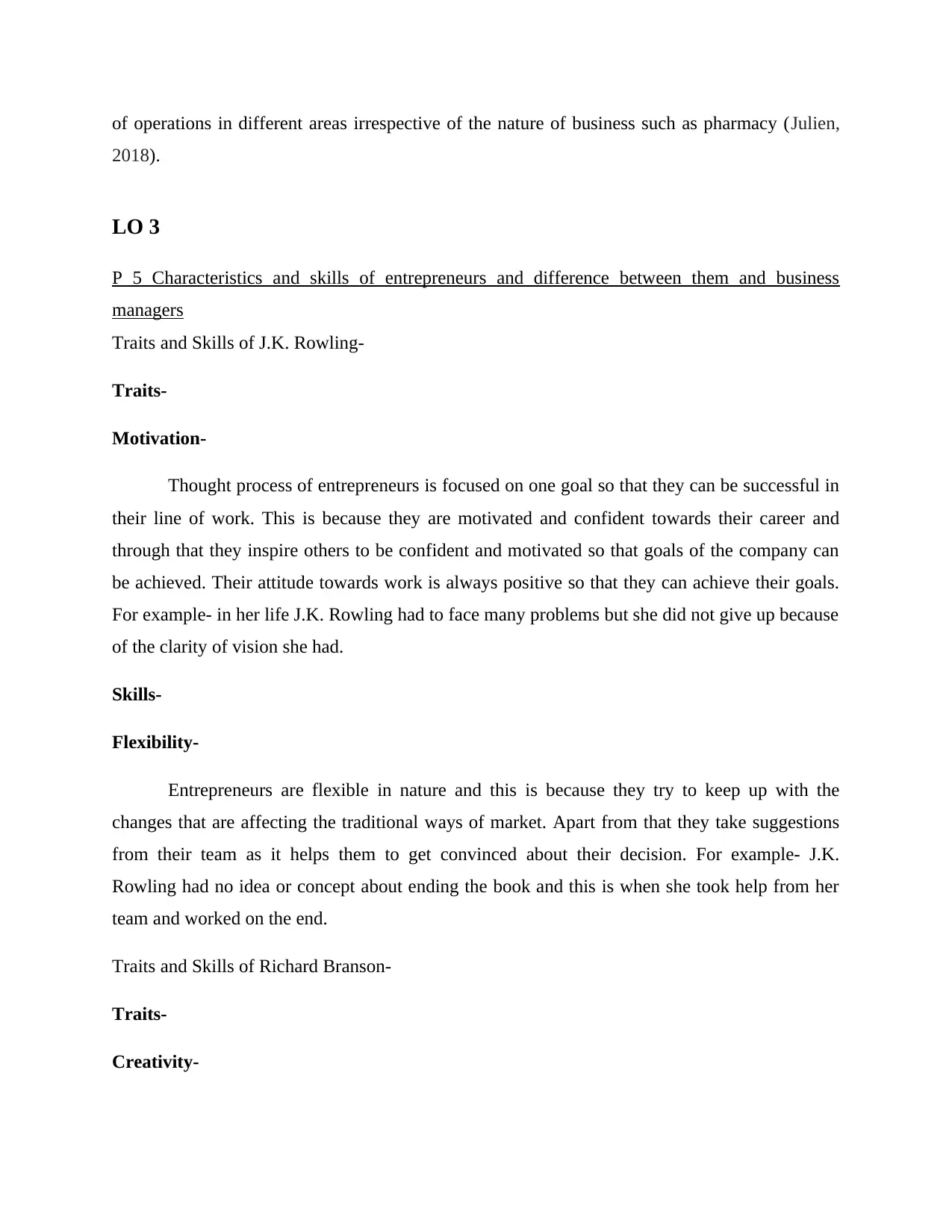
of operations in different areas irrespective of the nature of business such as pharmacy (Julien,
2018).
LO 3
P 5 Characteristics and skills of entrepreneurs and difference between them and business
managers
Traits and Skills of J.K. Rowling-
Traits-
Motivation-
Thought process of entrepreneurs is focused on one goal so that they can be successful in
their line of work. This is because they are motivated and confident towards their career and
through that they inspire others to be confident and motivated so that goals of the company can
be achieved. Their attitude towards work is always positive so that they can achieve their goals.
For example- in her life J.K. Rowling had to face many problems but she did not give up because
of the clarity of vision she had.
Skills-
Flexibility-
Entrepreneurs are flexible in nature and this is because they try to keep up with the
changes that are affecting the traditional ways of market. Apart from that they take suggestions
from their team as it helps them to get convinced about their decision. For example- J.K.
Rowling had no idea or concept about ending the book and this is when she took help from her
team and worked on the end.
Traits and Skills of Richard Branson-
Traits-
Creativity-
2018).
LO 3
P 5 Characteristics and skills of entrepreneurs and difference between them and business
managers
Traits and Skills of J.K. Rowling-
Traits-
Motivation-
Thought process of entrepreneurs is focused on one goal so that they can be successful in
their line of work. This is because they are motivated and confident towards their career and
through that they inspire others to be confident and motivated so that goals of the company can
be achieved. Their attitude towards work is always positive so that they can achieve their goals.
For example- in her life J.K. Rowling had to face many problems but she did not give up because
of the clarity of vision she had.
Skills-
Flexibility-
Entrepreneurs are flexible in nature and this is because they try to keep up with the
changes that are affecting the traditional ways of market. Apart from that they take suggestions
from their team as it helps them to get convinced about their decision. For example- J.K.
Rowling had no idea or concept about ending the book and this is when she took help from her
team and worked on the end.
Traits and Skills of Richard Branson-
Traits-
Creativity-
Paraphrase This Document
Need a fresh take? Get an instant paraphrase of this document with our AI Paraphraser
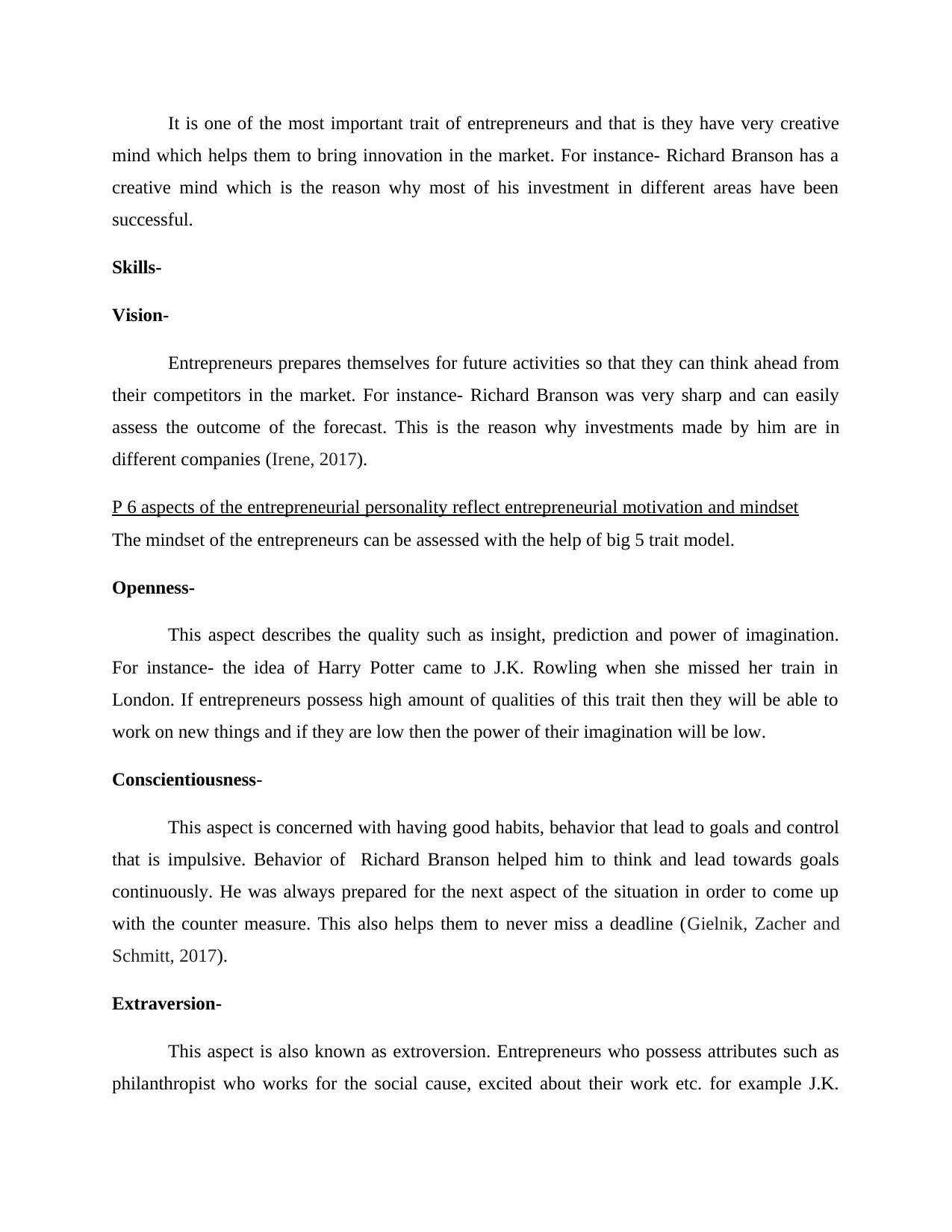
It is one of the most important trait of entrepreneurs and that is they have very creative
mind which helps them to bring innovation in the market. For instance- Richard Branson has a
creative mind which is the reason why most of his investment in different areas have been
successful.
Skills-
Vision-
Entrepreneurs prepares themselves for future activities so that they can think ahead from
their competitors in the market. For instance- Richard Branson was very sharp and can easily
assess the outcome of the forecast. This is the reason why investments made by him are in
different companies (Irene, 2017).
P 6 aspects of the entrepreneurial personality reflect entrepreneurial motivation and mindset
The mindset of the entrepreneurs can be assessed with the help of big 5 trait model.
Openness-
This aspect describes the quality such as insight, prediction and power of imagination.
For instance- the idea of Harry Potter came to J.K. Rowling when she missed her train in
London. If entrepreneurs possess high amount of qualities of this trait then they will be able to
work on new things and if they are low then the power of their imagination will be low.
Conscientiousness-
This aspect is concerned with having good habits, behavior that lead to goals and control
that is impulsive. Behavior of Richard Branson helped him to think and lead towards goals
continuously. He was always prepared for the next aspect of the situation in order to come up
with the counter measure. This also helps them to never miss a deadline (Gielnik, Zacher and
Schmitt, 2017).
Extraversion-
This aspect is also known as extroversion. Entrepreneurs who possess attributes such as
philanthropist who works for the social cause, excited about their work etc. for example J.K.
mind which helps them to bring innovation in the market. For instance- Richard Branson has a
creative mind which is the reason why most of his investment in different areas have been
successful.
Skills-
Vision-
Entrepreneurs prepares themselves for future activities so that they can think ahead from
their competitors in the market. For instance- Richard Branson was very sharp and can easily
assess the outcome of the forecast. This is the reason why investments made by him are in
different companies (Irene, 2017).
P 6 aspects of the entrepreneurial personality reflect entrepreneurial motivation and mindset
The mindset of the entrepreneurs can be assessed with the help of big 5 trait model.
Openness-
This aspect describes the quality such as insight, prediction and power of imagination.
For instance- the idea of Harry Potter came to J.K. Rowling when she missed her train in
London. If entrepreneurs possess high amount of qualities of this trait then they will be able to
work on new things and if they are low then the power of their imagination will be low.
Conscientiousness-
This aspect is concerned with having good habits, behavior that lead to goals and control
that is impulsive. Behavior of Richard Branson helped him to think and lead towards goals
continuously. He was always prepared for the next aspect of the situation in order to come up
with the counter measure. This also helps them to never miss a deadline (Gielnik, Zacher and
Schmitt, 2017).
Extraversion-
This aspect is also known as extroversion. Entrepreneurs who possess attributes such as
philanthropist who works for the social cause, excited about their work etc. for example J.K.
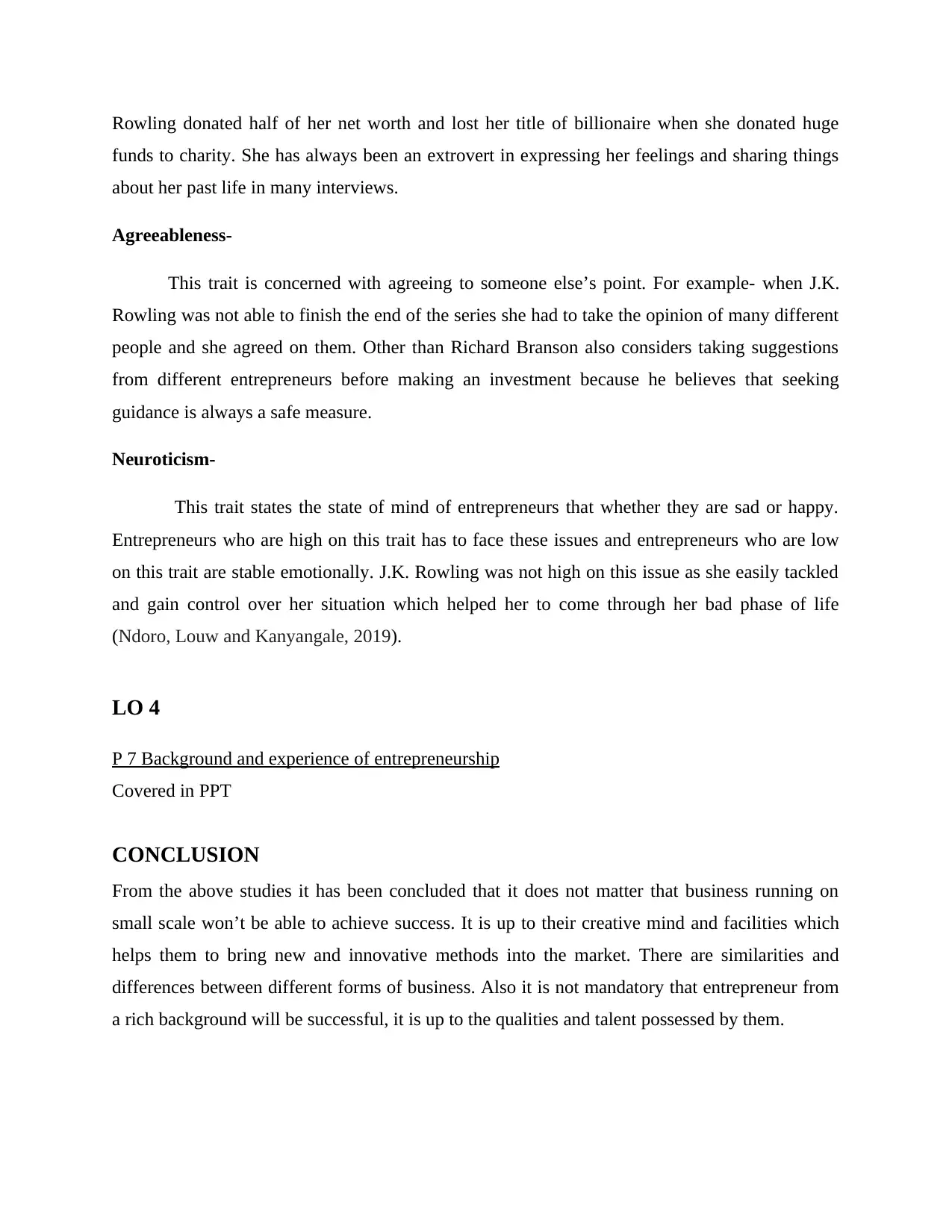
Rowling donated half of her net worth and lost her title of billionaire when she donated huge
funds to charity. She has always been an extrovert in expressing her feelings and sharing things
about her past life in many interviews.
Agreeableness-
This trait is concerned with agreeing to someone else’s point. For example- when J.K.
Rowling was not able to finish the end of the series she had to take the opinion of many different
people and she agreed on them. Other than Richard Branson also considers taking suggestions
from different entrepreneurs before making an investment because he believes that seeking
guidance is always a safe measure.
Neuroticism-
This trait states the state of mind of entrepreneurs that whether they are sad or happy.
Entrepreneurs who are high on this trait has to face these issues and entrepreneurs who are low
on this trait are stable emotionally. J.K. Rowling was not high on this issue as she easily tackled
and gain control over her situation which helped her to come through her bad phase of life
(Ndoro, Louw and Kanyangale, 2019).
LO 4
P 7 Background and experience of entrepreneurship
Covered in PPT
CONCLUSION
From the above studies it has been concluded that it does not matter that business running on
small scale won’t be able to achieve success. It is up to their creative mind and facilities which
helps them to bring new and innovative methods into the market. There are similarities and
differences between different forms of business. Also it is not mandatory that entrepreneur from
a rich background will be successful, it is up to the qualities and talent possessed by them.
funds to charity. She has always been an extrovert in expressing her feelings and sharing things
about her past life in many interviews.
Agreeableness-
This trait is concerned with agreeing to someone else’s point. For example- when J.K.
Rowling was not able to finish the end of the series she had to take the opinion of many different
people and she agreed on them. Other than Richard Branson also considers taking suggestions
from different entrepreneurs before making an investment because he believes that seeking
guidance is always a safe measure.
Neuroticism-
This trait states the state of mind of entrepreneurs that whether they are sad or happy.
Entrepreneurs who are high on this trait has to face these issues and entrepreneurs who are low
on this trait are stable emotionally. J.K. Rowling was not high on this issue as she easily tackled
and gain control over her situation which helped her to come through her bad phase of life
(Ndoro, Louw and Kanyangale, 2019).
LO 4
P 7 Background and experience of entrepreneurship
Covered in PPT
CONCLUSION
From the above studies it has been concluded that it does not matter that business running on
small scale won’t be able to achieve success. It is up to their creative mind and facilities which
helps them to bring new and innovative methods into the market. There are similarities and
differences between different forms of business. Also it is not mandatory that entrepreneur from
a rich background will be successful, it is up to the qualities and talent possessed by them.
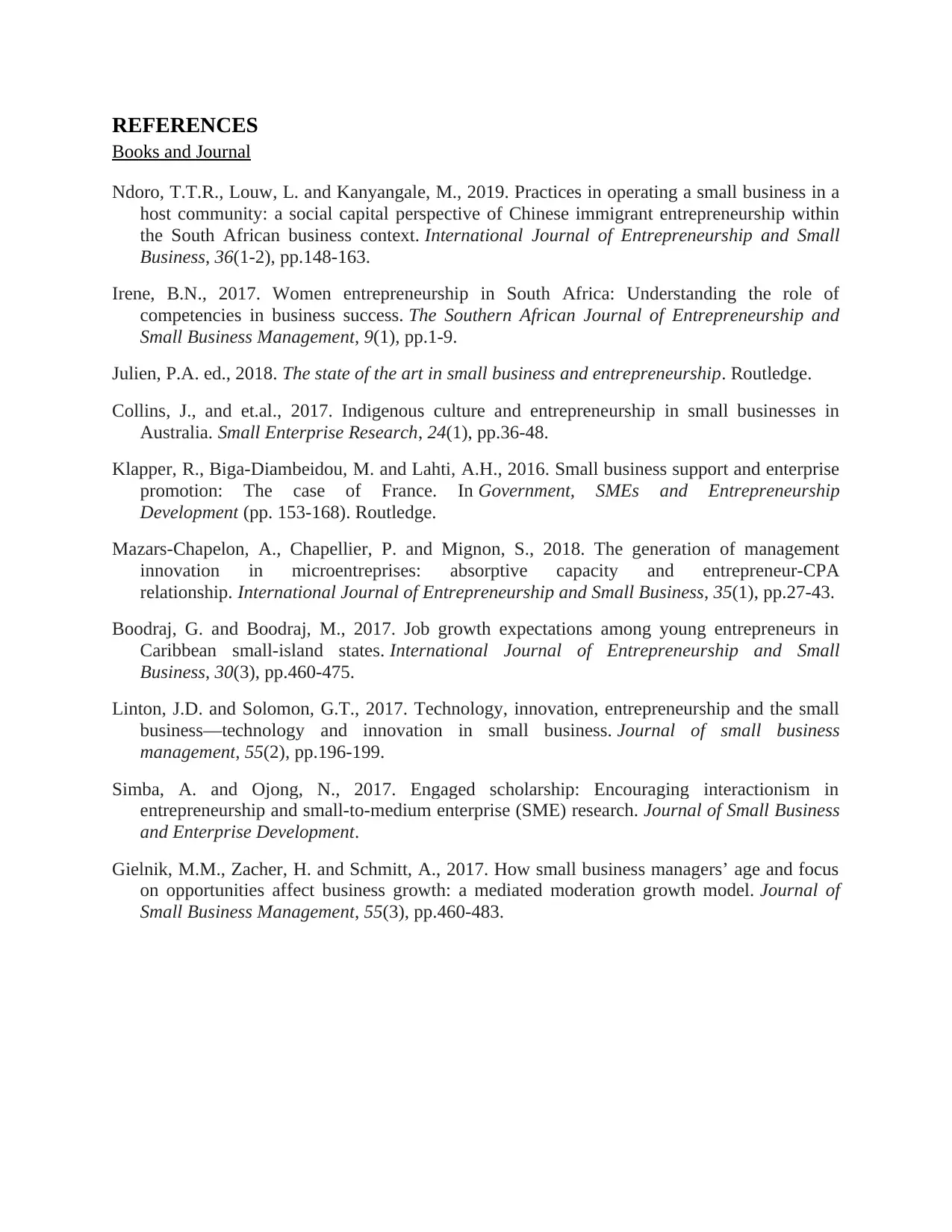
REFERENCES
Books and Journal
Ndoro, T.T.R., Louw, L. and Kanyangale, M., 2019. Practices in operating a small business in a
host community: a social capital perspective of Chinese immigrant entrepreneurship within
the South African business context. International Journal of Entrepreneurship and Small
Business, 36(1-2), pp.148-163.
Irene, B.N., 2017. Women entrepreneurship in South Africa: Understanding the role of
competencies in business success. The Southern African Journal of Entrepreneurship and
Small Business Management, 9(1), pp.1-9.
Julien, P.A. ed., 2018. The state of the art in small business and entrepreneurship. Routledge.
Collins, J., and et.al., 2017. Indigenous culture and entrepreneurship in small businesses in
Australia. Small Enterprise Research, 24(1), pp.36-48.
Klapper, R., Biga-Diambeidou, M. and Lahti, A.H., 2016. Small business support and enterprise
promotion: The case of France. In Government, SMEs and Entrepreneurship
Development (pp. 153-168). Routledge.
Mazars-Chapelon, A., Chapellier, P. and Mignon, S., 2018. The generation of management
innovation in microentreprises: absorptive capacity and entrepreneur-CPA
relationship. International Journal of Entrepreneurship and Small Business, 35(1), pp.27-43.
Boodraj, G. and Boodraj, M., 2017. Job growth expectations among young entrepreneurs in
Caribbean small-island states. International Journal of Entrepreneurship and Small
Business, 30(3), pp.460-475.
Linton, J.D. and Solomon, G.T., 2017. Technology, innovation, entrepreneurship and the small
business—technology and innovation in small business. Journal of small business
management, 55(2), pp.196-199.
Simba, A. and Ojong, N., 2017. Engaged scholarship: Encouraging interactionism in
entrepreneurship and small-to-medium enterprise (SME) research. Journal of Small Business
and Enterprise Development.
Gielnik, M.M., Zacher, H. and Schmitt, A., 2017. How small business managers’ age and focus
on opportunities affect business growth: a mediated moderation growth model. Journal of
Small Business Management, 55(3), pp.460-483.
Books and Journal
Ndoro, T.T.R., Louw, L. and Kanyangale, M., 2019. Practices in operating a small business in a
host community: a social capital perspective of Chinese immigrant entrepreneurship within
the South African business context. International Journal of Entrepreneurship and Small
Business, 36(1-2), pp.148-163.
Irene, B.N., 2017. Women entrepreneurship in South Africa: Understanding the role of
competencies in business success. The Southern African Journal of Entrepreneurship and
Small Business Management, 9(1), pp.1-9.
Julien, P.A. ed., 2018. The state of the art in small business and entrepreneurship. Routledge.
Collins, J., and et.al., 2017. Indigenous culture and entrepreneurship in small businesses in
Australia. Small Enterprise Research, 24(1), pp.36-48.
Klapper, R., Biga-Diambeidou, M. and Lahti, A.H., 2016. Small business support and enterprise
promotion: The case of France. In Government, SMEs and Entrepreneurship
Development (pp. 153-168). Routledge.
Mazars-Chapelon, A., Chapellier, P. and Mignon, S., 2018. The generation of management
innovation in microentreprises: absorptive capacity and entrepreneur-CPA
relationship. International Journal of Entrepreneurship and Small Business, 35(1), pp.27-43.
Boodraj, G. and Boodraj, M., 2017. Job growth expectations among young entrepreneurs in
Caribbean small-island states. International Journal of Entrepreneurship and Small
Business, 30(3), pp.460-475.
Linton, J.D. and Solomon, G.T., 2017. Technology, innovation, entrepreneurship and the small
business—technology and innovation in small business. Journal of small business
management, 55(2), pp.196-199.
Simba, A. and Ojong, N., 2017. Engaged scholarship: Encouraging interactionism in
entrepreneurship and small-to-medium enterprise (SME) research. Journal of Small Business
and Enterprise Development.
Gielnik, M.M., Zacher, H. and Schmitt, A., 2017. How small business managers’ age and focus
on opportunities affect business growth: a mediated moderation growth model. Journal of
Small Business Management, 55(3), pp.460-483.
Secure Best Marks with AI Grader
Need help grading? Try our AI Grader for instant feedback on your assignments.

1 out of 11
Related Documents
Your All-in-One AI-Powered Toolkit for Academic Success.
+13062052269
info@desklib.com
Available 24*7 on WhatsApp / Email
![[object Object]](/_next/static/media/star-bottom.7253800d.svg)
Unlock your academic potential
© 2024 | Zucol Services PVT LTD | All rights reserved.





